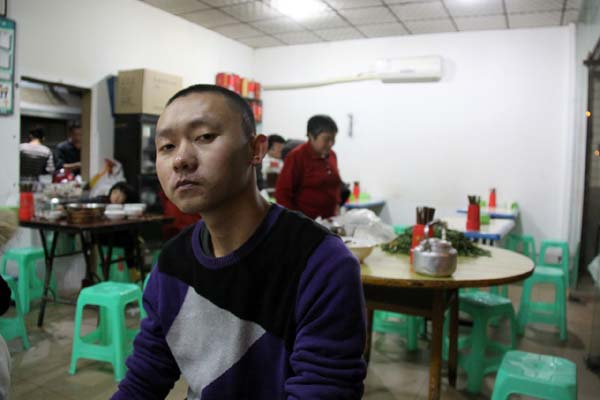Man freed after posting 'improper information'
Updated: 2012-11-21 02:13
By ZHAO YINAN (China Daily)
|
||||||||
 |
|
At a small restaurant, Ren Jianyu has his first meal on Monday after his release from a re-education labor camp in Yongzhou, Chongqing. [Photo/China Daily] |
Former Chongqing village official, Ren Jianyu, has decided to continue his quest for justice after being confined for more than a year without trial, after a local court dismissed his initial lawsuit on Tuesday.
After the court hearing, Ren, 25, said he was "depressed, but not entirely surprised", because the court had briefed him about what they may do with the case.
He said he will continue his appeal against the Chongqing Laojiao Committee that sentenced him to jail, and will seek State compensation and compensation for mental damage.
Last September, Chongqing Laojiao Committee sentenced Ren, then a village official who was about to become a formal civil servant, to two years in confinement for his spreading more than 100 pieces of "negative comments and information" about current affairs and domestic political reform on his micro blog and QQ, a Chinese instant messaging service.
Ren's sentence came amid a citywide crime crackdown initiated by former Chongqing Party chief Bo Xilai. Bo was sacked in March this year for severe disciplinary violations.
Ren decided to file a lawsuit against the committee in August, and was released on Monday after serving about half of the term as the committee said the decision was "inappropriate".
Ren's case has, again, prompted speculation on the disputed laojiao system, or re-education through labor, which can take a person's freedom for up to four years without a trial according to rules and regulations in China.
Yang Junxiang, a media officer of Chongqing No 3 Intermediate People's Court, said on Tuesday the panel of three judges rejected Ren's lawsuit because it has exceeded the time limit for filing a lawsuit against an administrative decision, which is required within three months under the country's Administrative Procedure Law.
In a statement released after the court hearing on Tuesday afternoon, the court said: "To carry out the right to protect oneself by filing a case should be abided by law".
The statement also said governmental power should be "used with prudence and in accordance with law, especially when it can lead to depriving a person of their freedom".
The court urged government organs to "moderately tolerate radical and improper remarks", and to correct "any administrative decisions that are tainted with procedural or substantive mistakes", said the statement.
This year, at least three people in Chongqing have been released after receiving an "inappropriate" laojiao decision, said Pu Zhiqiang, Ren's lawyer.
Pu said he doesn't think Ren's case has exceeded the legitimate time limit, since a judicial interpretation of the country's top court has previously not counted the time a person spent in custody as part of the three month time limit.
"But Chongqing judges have made their efforts. Without them, the case cannot be filed and I don't think the laojiao authorities can eventually revoke their decision and free Ren," he said.
Pu said he will help Ren appeal to a higher court and even to the country's top court.
Xu Xin, a law professor from Beijing Institute of Technology, said he felt relieved upon learning Ren has been freed, but said the officials who made the decision that led to Ren's sentence should be held responsible.
The laojiao system has been in the spotlight since early in the year, when several controversial cases of people being wrongfully sent for laojiao prompted public scrutiny of the 50-year-old method of punishment.
The laojiao system can confine a person for three years without going through the courts, and the punishment can be extended to a fourth year if the inmate is considered not sufficiently re-educated.
Jiang Wei, an official in charge of the Central Leading Group for Judicial Reform, admitted at a news conference in October that there are loopholes in the laojiao system.
Although Jiang upheld that the laojiao system is legitimate and positive in many ways, he admitted reform is necessary, such as in the approval procedure in which authorities decide if a person should receive a laojiao sentence.
Jiang confirmed previous media reports that pilot reforms have been rolled out in parts of the country, including Nanjing in Jiangsu province, but he did not reveal further information.
Wang Gongyi, director of the research office of the Ministry of Justice, said in October at a seminar that China has about 60,000 people serving a laojiao sentence, and most of them are serving a sentence of six months to one year.
Contact the writer at zhaoyinan@chinadaily.com.cn

 Relief reaches isolated village
Relief reaches isolated village
 Rainfall poses new threats to quake-hit region
Rainfall poses new threats to quake-hit region
 Funerals begin for Boston bombing victims
Funerals begin for Boston bombing victims
 Quake takeaway from China's Air Force
Quake takeaway from China's Air Force
 Obama celebrates young inventors at science fair
Obama celebrates young inventors at science fair
 Earth Day marked around the world
Earth Day marked around the world
 Volunteer team helping students find sense of normalcy
Volunteer team helping students find sense of normalcy
 Ethnic groups quick to join rescue efforts
Ethnic groups quick to join rescue efforts
Most Viewed
Editor's Picks

|

|

|

|

|

|
Today's Top News
Health new priority for quake zone
Xi meets US top military officer
Japan's boats driven out of Diaoyu
China mulls online shopping legislation
Bird flu death toll rises to 22
Putin appoints new ambassador to China
Japanese ships blocked from Diaoyu Islands
Inspired by Guan, more Chinese pick up golf
US Weekly

|

|






